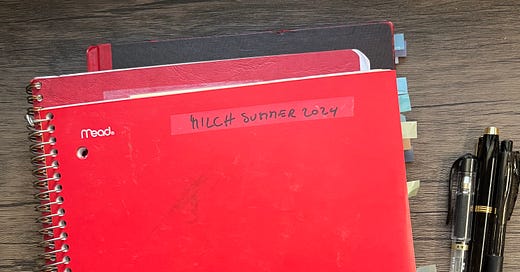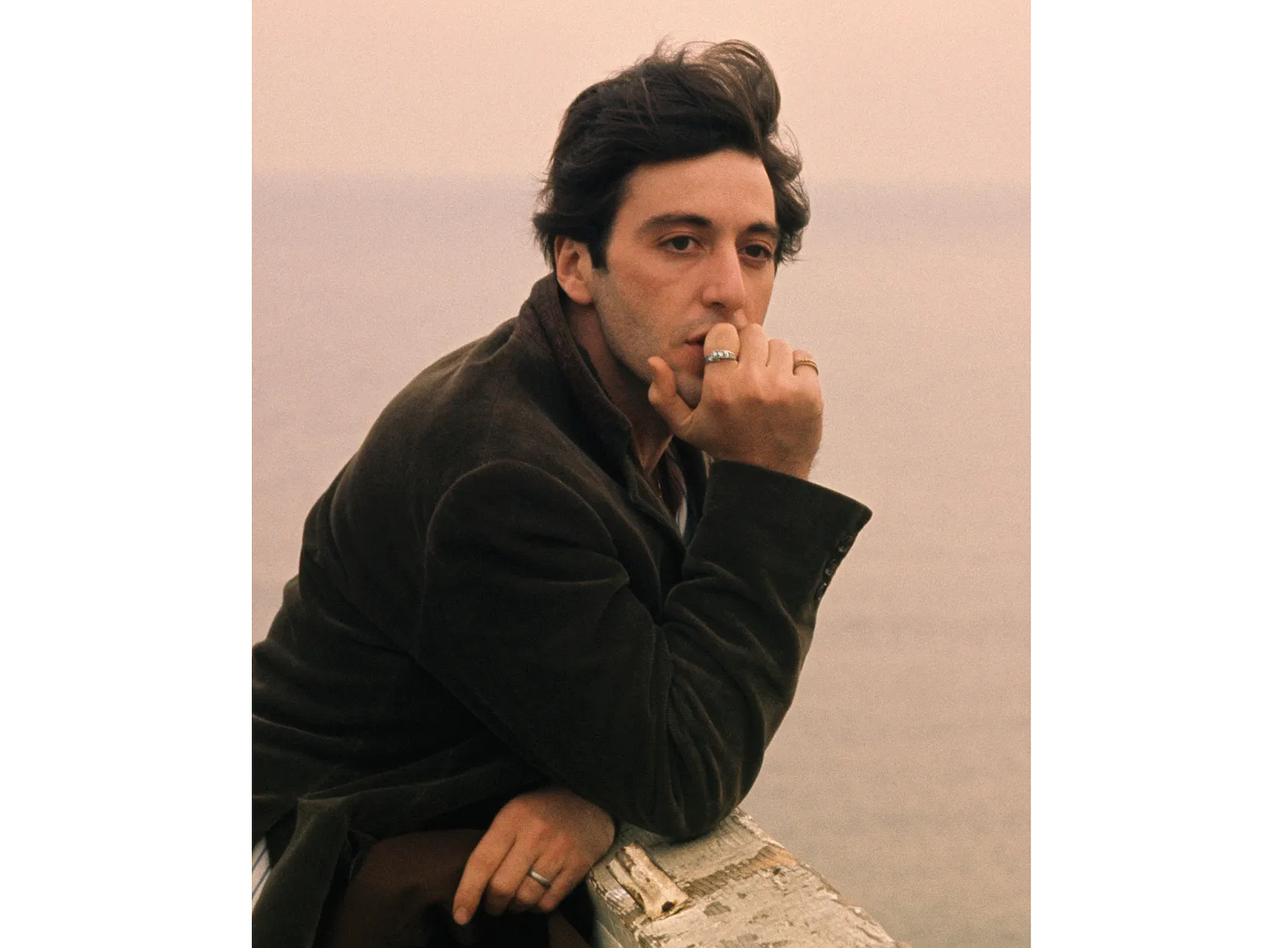Long before he was a famous actor (weighed down by his money), Al Pacino was just another poor New York City kid trying to make rent. One summer, he spent all day on the Subway to get to Rockaway Beach in Queens and borrow $5 from friends for rent. At least he didn’t have to make the trip alone.
“I would read Balzac, Baudelaire, and Flaubert,” Pacino wrote in his memoir, “from pocket-size books with the tiniest type you’ve ever seen.” Before his career took off, he spent his free time at the library and coffee shops with his “little books of the great authors.”
There was something so absorbing about that gift of reading. It could calm your mind and give you another world to be engaged in. Television was too distant; books were more intimate, like having friends and enjoying their company. I would be reading A Moveable Feast and thinking, I don’t want to finish the pages, I like it here too much.
It reminded me of Stephen King’s On Writing in which he called books “uniquely portable magic” that offers the reader an “escape hatch” from reality. But is the same not true for the writer? When King sits down at his computer, that’s his escape.
Gertrude Stein once wrote that masterpieces “tell about time and identity” but must be created while time and identity cease to exist. In other words, the creator must lose themselves to the work. It’s like a portal opens that allows both reader and writer to experience a moment of freedom from themselves.
Even though I’ve struggled to publish recently, I write a lot. Not just for the Substack but by hand for myself. I write in journals and notebooks, at home, at coffee shops, at the library, at airports, you name it. I’ve accepted writing as my default response to life, my way of processing and translating my experiences. “I have to write. Because if I don’t write something and keep on being obsessed by it,” Argentinian writer Jorge Luis Borges said. “I have to write it and be rid of it.” That’s what it feels like. A compulsion, almost.
I often wonder if it is not self-indulgent navel-gazing. And yet I believe we all should write.
Writing sharpens your thinking. The page exposes the edges of your knowledge and sheds light on your biases. In your sentences, you stumble over the gaps in your understanding. Writing is re-writing, William Zinsser pointed out in the classic On Writing Well. Re-writing is a chance to re-think. And what you can’t see, your readers will helpfully point out.
Writing is also about feeling. Before translating an experience into words, we must allow ourselves to experience it fully. In the excellent Writing Down the Bones, Natalie Goldberg called the writer the “carrier of details that make up history.” We must be present and sensitive to our lives “at once ordinary and mythical.” Writing means, Goldberg wrote, “to say a real yes to the real truth of who we are.” This can also help us be more curious and compassionate about others: a good character sketch, I learned from David Milch, is an exercise in capturing contradictions.
The experience of writing strikes me as a form of alchemy. It is a chance to change our story by accepting our history, then leaving it on the page.
“Your hand is pouring out the record of your senses,” Goldberg explains and tells aspiring writers to keep their pens moving no matter what. Write until you learn what lies beyond the thinking mind. Write until the ink leads you from mind to heart.
I have fallen in love with these stream-of-consciousness handwriting exercises. Dr. John Sarno made his patients write to release emotional pain which he thought was manifesting as physical ailments (like back pain). It’s a simple technique that reliably leads me to the tears of buried feelings (one of his disciples has a podcast that explains the method in the first few episodes). Another technique I use is David Milch’s inner dialogue.
Writing helps me move through the maze. Sometimes the page offers sanctuary from the storm. On other days, it is the dragon’s cave waiting in my deepest inner caverns, beckoning with a trail of bleached bones. The pen is like a torch that lets me move forward in the dark. The page also keeps me awake when I am terrified of slipping back into numbness. It exposes comforting lies that could lull me back to sleep. The page may not have an answer, but it knows where the bodies are buried.
“A writer is deeply conflicted,” Leonard Cohen said, “and it’s in his work that he reconciles those deep conflicts. It doesn’t set the world in order. It doesn’t really change anything. It just is a kind of harbor.”
The search for true words is a way of exploring your inner palace and finding its secret wings. It is a chance to meet yourself and let your shadow speak. At its best — raw, unpredictable, vulnerable — it feels like a confession. It connects the three selves and lets them speak into the silence. This, I’ve realized recently, makes it a form of prayer.
If nothing else, writing is movement and a sign of life. If the pen moves, I move. I am still here, still kicking and breathing. Writing is a way of moving through life — or letting life move through me.
An invitation.
Write for yourself. Write something selfish, but write it honestly, as honestly as you can bear. Write until the page is drenched with the truths you avoid. Write something so selfish it takes you beyond yourself.
Write not because you know the answers, but because you can’t bear the weight of the questions in silence. Write until your heart lightens.
Write not because you’ve seen the light, but to light a candle until dawn.
Write about what is left unsettled when everything has been sorted out.
Write words that weigh you down. Write when you crawl off the battlefield in defeat, covered in mud and blood.
Write words that lift you by the spine. Write in triumph, when you roar with the force of a thousand horses.
Write because the words of the dead came alive inside you. Write because someone once dropped a pebble in the pond of time and you were touched by the ripples.
Write to send out your spirit. Write until you feel the heartbeat of a lonely person on a distant subway. Write them a crooked text, a ramshackle dwelling, an imperfect shelter.
Don’t write to understand, write to take a stand. Then let yourself fall.
Write out of defiance. Write to show you care. Write to show your core.
Write because there must be hope. Write for a future of reading, breathing human beings coming to terms with what it means to live and die.
Write yourself a bridge to the future. Cross it, burn it, forget it.
Write like you’re the last witness.
Write to become immortal, then let yourself be forgotten.
Don’t write to earn a living but because you’ve tasted life. Write to feel alive, as a way of life. Write to live.
Why write? Why do anything. To fill the world with more of what we love. Write as an act of faith, to create the world you want.
Write because you’re still here. Write because you can. Write like the world depends on it. Maybe it does.
I write because I believe it has the power to transform. I write because I believe. I write because I love it and because it lets me love, or at least accept, what may otherwise feel unlovable.
— Frederik
I’m thinking about offering a (monthly?) Zoom session to get together to write and share/discuss.
Previous reflections on writing:
Things I’ve recently enjoyed about writing:
Writing Down the Bones: Freeing the Writer Within (How to become a good writer? “Read a lot, listen well and deeply, and write a lot.”)
“Writers are great lovers. They fall in love with other writers. That's how they learn to write. They take on a writer, read everything by him or her, read it over again until they understand how the writer moves, pauses, and sees. That's what being a lover is: stepping out of yourself, stepping into someone else's skin.” ― Natalie Goldberg, Writing Down the Bones: Freeing the Writer Within






So many gems that feel perfect. Maybe one of my favorite pieces of yours (a hard task to choose!) 🙏🏾
A day without writing is a wasted day, in my view. Thank you for articulating with such eloquence what writing means to writers.